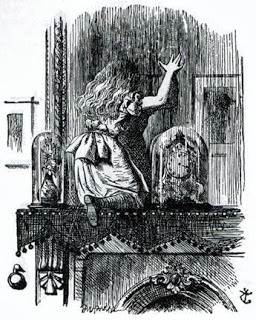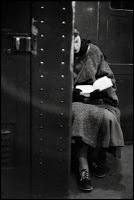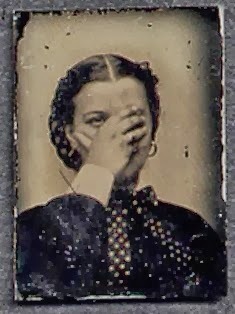In the Kingdom of the Blind
 I’ve been asked many times about how old I was when I knew I was a writer. I don’t think I accepted that I was a writer of fiction until I was 39, the year I started The River of No Return. But I have always been fascinated by fiction, by storytelling, by the fine line between truth and fiction. Many of my earliest memories are, in one way or another, about the power of fiction. This one that I’m about to tell you is a sad story. Fundamentally it’s about betrayal – with me in the part of the bad guy.
I’ve been asked many times about how old I was when I knew I was a writer. I don’t think I accepted that I was a writer of fiction until I was 39, the year I started The River of No Return. But I have always been fascinated by fiction, by storytelling, by the fine line between truth and fiction. Many of my earliest memories are, in one way or another, about the power of fiction. This one that I’m about to tell you is a sad story. Fundamentally it’s about betrayal – with me in the part of the bad guy.I first learned to make fiction when I was in the hospital. I was four.
That year, I lost the sight in my right eye due to a rare, hard-to-diagnose condition. There was nothing to be done, but once they had managed to diagnose it, the doctors at Massachusetts Eye and Ear wanted me to come to the hospital in Boston for a week, so that they could show my eye to students and take photographs of my retina for textbooks.
I could still see perfectly well out of my left eye, but my brain had not yet learned to ignore the message that my blind eye was sending: Darkness – Darkness! Because my brain was still melding the information received from both my eyes into one picture, my vision was distorted and washed across with black.
I was put into the blind children's ward at the hospital. My sight was temporarily darkened, but some of the children were terribly sensitive to brightness, so the walls were painted gray, and the lights were very dim. There were three big, wooden cribs in my dark room. The cribs offended me: I wasn’t a baby. To add insult in injury, the cribs had plastic bubbles that fixed to them, to keep their inmates from climbing out. I was further offended: I knew better than to do that.
 Nevertheless, there I was, confined. Mine was the crib by the door. The middle crib held a little girl, only two years old, who had lost her sight to a quick-moving degenerative disease. The child in the crib by the window (always kept shuttered) was a boy my age. He was newly blind, and he wanted, incessantly, to play soldiers. He would stick his arm out through the slats and shoot at me with his index finger, through and across the little girl’s crib. Normally, I was not allowed to play war games. But my mother, torn between her pacifism and her sympathy for the boy, decided that I should play along with him. So I was allowed to shoot back.
Nevertheless, there I was, confined. Mine was the crib by the door. The middle crib held a little girl, only two years old, who had lost her sight to a quick-moving degenerative disease. The child in the crib by the window (always kept shuttered) was a boy my age. He was newly blind, and he wanted, incessantly, to play soldiers. He would stick his arm out through the slats and shoot at me with his index finger, through and across the little girl’s crib. Normally, I was not allowed to play war games. But my mother, torn between her pacifism and her sympathy for the boy, decided that I should play along with him. So I was allowed to shoot back.It was fun, reaching my arm out with such willful purpose, my finger a pistol. I yelled: “Bang! Bang!” The forbidden words felt good on my tongue. I loved what the boy was teaching me. I relished the feelings the new game cooked up in my heart: danger, power, exhilaration.
But there was a technical problem. It was clear to me that he was failing to hit me, or even to shoot anywhere near me, while I, on the other hand, nailed him every time, right in the heart. Nevertheless, he refused to die. “I hit you,” I yelled. “Did not! I hit you,” he yelled back. “Did not,” I yelled. This went on and on, until finally I felt it necessary to explain to him that I could tell he had been hit, and that I was unscathed. After all, I told him, I could see, and he was blind.
My mother was horrified. “You pretend,” she whispered. “He will never see again. You pretend he hit you.”
 With my mother’s words, my entire universe shifted around me. I understood the meaning of what I had just said to the boy: “I can see and you are blind.” I felt what I had never felt before: the extreme precariousness of existence. At the same time I felt a sagging sort of relief as I realized my luck. I was in the blind ward, surrounded by blind children, but I could see. I was going to go back to light, to colors, while the newly blind boy didn’t even know that the room we were in was dark and gray. He didn’t even know that he couldn’t convincingly hit anybody with a gun-finger. I was four years old. In retrospect I am appalled by my own bloodthirsty self-absorption. I don’t think I felt pity, or empathy, or anything at all other than the adrenaline-driven wonder at being, myself, safe in my ability to see.
With my mother’s words, my entire universe shifted around me. I understood the meaning of what I had just said to the boy: “I can see and you are blind.” I felt what I had never felt before: the extreme precariousness of existence. At the same time I felt a sagging sort of relief as I realized my luck. I was in the blind ward, surrounded by blind children, but I could see. I was going to go back to light, to colors, while the newly blind boy didn’t even know that the room we were in was dark and gray. He didn’t even know that he couldn’t convincingly hit anybody with a gun-finger. I was four years old. In retrospect I am appalled by my own bloodthirsty self-absorption. I don’t think I felt pity, or empathy, or anything at all other than the adrenaline-driven wonder at being, myself, safe in my ability to see. The game was no longer a game. I interpreted my mother’s words – "you pretend" – to mean that because I could see, I must lie. I didn’t have to do much to execute this duty. I didn’t even have to stick my arm out of my crib. I could just sit on the thin, plastic-covered mattress and say “Bang,” then “Oh, ow, I’m dead.”
It was a horrible, hollow – even an evil – sort of victory. I was no longer playing, I was pretending to play. I thought I was the winner, before the game even began.
I watched him now with the detached interest of a scientist (or perhaps, of a writer). I felt his excitement in the game slap against the plastic bubble that kept me in my cage. He leaned his skinny chest hard against the bars of his, his gun-arm reaching out toward me as far as it could strain, his eyes open wide over his smile, his finger crooking as he shot. I sat at my ease and watched him and I said the things he wanted to hear. That I was exchanging fire with him, that he could touch me, that he could alter my being.
 Two children playing at war can transform a darkened hospital room into a battlefield with nothing more than their eager fingers and their shrill voices. Children imagining together are not making fiction, in the way that adults make fiction. When I claimed that the blind boy’s bullets weren’t hitting me, I broke the toy of childhood make-believe. In order to patch it back together again for his continued pleasure, I had to become a maker of fiction, a fabulist, a little man behind the curtain. But what I had yet to learn is that working alone to make fiction is hard. Creating a world that can seduce a reader requires intense commitment. A good writer can’t just sit cross-legged and say “bang bang” in a bored voice.
Two children playing at war can transform a darkened hospital room into a battlefield with nothing more than their eager fingers and their shrill voices. Children imagining together are not making fiction, in the way that adults make fiction. When I claimed that the blind boy’s bullets weren’t hitting me, I broke the toy of childhood make-believe. In order to patch it back together again for his continued pleasure, I had to become a maker of fiction, a fabulist, a little man behind the curtain. But what I had yet to learn is that working alone to make fiction is hard. Creating a world that can seduce a reader requires intense commitment. A good writer can’t just sit cross-legged and say “bang bang” in a bored voice.I think I remember the moment the game ended forever, but I’m not sure what it is that I remember. I think I remember watching the transition, as he realized that he was playing alone, that I was only pretending to pretend. I think I remember watching his face change, seeing the expression of bleak understanding come into his eyes – his blind eyes. His gun-hand withdrew. I think I remember seeing that. But that is overly sentimental, so like a movie. With our greedy eyes we watch the blind child realize his terrible loss. Surely I made that part up?
 The other thing I might remember is a sound, not a sight. My mother sat beside my crib, reading. She sat there all week, day in and day out. She even slept in her chair, never once leaving me alone. I think that I might remember sitting in my crib, facing the room and the boy, and hearing, behind me, the sound of my mother slipping a finger under a page as she read. Then a pause as she came to the end of the page, then the crisp sound of paper lifting up and turning over. But that seems overly symbolic, so like a novel. And so, with the loss of innocence, one chapter of life ends and another begins. Surely I have superimposed the memory of my mother turning a page onto my memory of the end of the game?
The other thing I might remember is a sound, not a sight. My mother sat beside my crib, reading. She sat there all week, day in and day out. She even slept in her chair, never once leaving me alone. I think that I might remember sitting in my crib, facing the room and the boy, and hearing, behind me, the sound of my mother slipping a finger under a page as she read. Then a pause as she came to the end of the page, then the crisp sound of paper lifting up and turning over. But that seems overly symbolic, so like a novel. And so, with the loss of innocence, one chapter of life ends and another begins. Surely I have superimposed the memory of my mother turning a page onto my memory of the end of the game? I have dedicated myself to fiction, as an English teacher and a novelist and, in my leisure time, as an escape artist. So perhaps, as I remember back to my time in the blind ward, fiction has overwhelmed me. Pretending to pretend to pretend . . . even now, my attempt to toss aloft some sort of “truth” about the making of fiction has succumbed to gravity. “Truth” has plunged back to my hand, untrue. My only memories of the blind boy serve my own self-fashioning. I don’t remember anything else at all about him, not even his name.
I have dedicated myself to fiction, as an English teacher and a novelist and, in my leisure time, as an escape artist. So perhaps, as I remember back to my time in the blind ward, fiction has overwhelmed me. Pretending to pretend to pretend . . . even now, my attempt to toss aloft some sort of “truth” about the making of fiction has succumbed to gravity. “Truth” has plunged back to my hand, untrue. My only memories of the blind boy serve my own self-fashioning. I don’t remember anything else at all about him, not even his name.
Published on October 16, 2013 10:42
date newest »
newest »
 newest »
newest »
message 1:
by
Kim
(new)
Oct 21, 2013 03:47PM
 Wow! This is an incredibly moving story, Bee. Thank you so much for sharing it.
Wow! This is an incredibly moving story, Bee. Thank you so much for sharing it.
reply
|
flag



